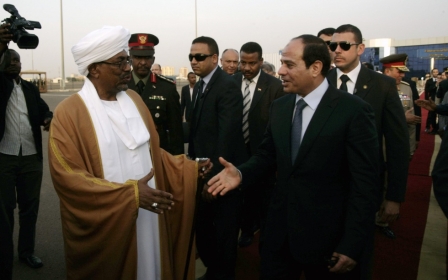Thousands demonstrate outside army headquarters in Khartoum for second day

Thousands of protesters held a second day of protests outside the Sudanese army headquarters in downtown Khartoum on Sunday, with calls growing for President Omar al-Bashir to resign.
Chanting "peace, justice, freedom" they massed outside the army headquarters which also houses Bashir's official residence and the defence ministry, many of them having spent the night there.
"After what we did yesterday, we will not leave this area now until our mission is accomplished," said protester Osama Ahmed, who spent the night outside the compound.
"We won't leave this area until he steps down," he said, referring to Bashir.
Stay informed with MEE's newsletters
Sign up to get the latest alerts, insights and analysis, starting with Turkey Unpacked
Some protesters also blocked a nearby bridge linking Khartoum with the northern Bahari district with rocks causing huge traffic jams, witnesses said.
Footage from Saturday's protest posted online showed demonstrators chanting "One Army, One People" as they gathered outside the army complex, which also houses Bashir's residence.
Organisers had called the protests to mark the anniversary of the 1985 uprising against former military dictator Jaafar Nimeiry, who came to power after a military coup in 1969.
Protester Amir Omer said the demonstrators had managed to send a message to the military. "We still haven't achieved our goal, but we have delivered our message to the army and that is: Come join us," he told AFP.
Pharmacist Yassir Altybe, 35, told MEE that the number of protesters increased as people flowed in from different neighbourhoods, converging on the military centre. “I can see thousands of people gathering in front of the army headquarters, calling on Bashir to step down,” Altybe said.
By the evening, the clashes had subsided as security forces pulled back, allowing the thousands still gathered to remain outside the compound. Witnesses said young demonstrators sang nationalist songs and danced for joy. Some said they would stay until Bashir stepped down, Reuters reported. Later, the organisers issued a call for a general strike on Sunday.
Protests have rocked the east African country for more than three months, with angry crowds accusing Bashir's government of mismanaging the economy, leading to soaring food prices and regular shortages of fuel and foreign currencies.
The protest movement was initially led by the Sudanese Professionals Association (SPA), but later several political parties including the main opposition National Umma Party threw their support behind it.
SPA had called on people to stage sit-ins blocking roads around army headquarters until the president steps down. “We are close to a big victory, so we call on the people not to leave their places and to stage sit-ins until the dictator steps down,” SPA said in a statement sent to MEE.
In recent days, activists had been circulating leaflets urging people to participate in Saturday's march, several residents said.
Analysts say the movement has emerged as the biggest challenge yet to Bashir's three-decade rule. Still, the veteran leader has remained defiant and has introduced tough measures that have seen protesters, opposition leaders, activists and journalists arrested.
“I saw security troops on vehicles heading towards the demonstrators using tear gas,” witness Hamid Mustafa told MEE.
Another eyewitness, Rasha Abdul Motaal, told MEE that hundreds of people had been arrested in downtown Khartoum. “The security forces are conducting a wide detention campaign against the activists, hundreds have been arrested,” she said.
On 22 February, the veteran leader imposed a nationwide state of emergency to quell the demonstrations after an initial crackdown failed to rein in protests.
Since the emergency came into effect, protests have been largely confined to the capital and its twin city of Omdurman, but organisers had called for widespread rallies as well as the march on the army headquarters on Saturday.
Thousands of people were also seen protesting in Port Sudan, Kassala, Rabak, Qadaref, Nyala and other towns, according to multiple eyewitnesses, MEE was told.
Before the demonstrations began, security forces had already deployed in large numbers in key Khartoum squares and in Omdurman, across the Nile. Shops and markets in downtown Khartoum were ordered shut by security agents, according to onlookers.
Witnesses said plainclothes security agents were preventing even passers-by from reaching downtown areas.
"Those walking in groups were immediately detained or asked to return to their homes by security forces," said another onlooker.
"There's a heavy security deployment where the protesters were to gather for the march, but they still came out and are chanting anti-government slogans," a witness told AFP, without revealing his name for security reasons.
Officials say 31 people have died in protest-related violence so far, but Human Rights Watch has put the death toll at 51 including children and medics.
- Mohammed Amin in Khartoum contributed to this story.
Middle East Eye delivers independent and unrivalled coverage and analysis of the Middle East, North Africa and beyond. To learn more about republishing this content and the associated fees, please fill out this form. More about MEE can be found here.






